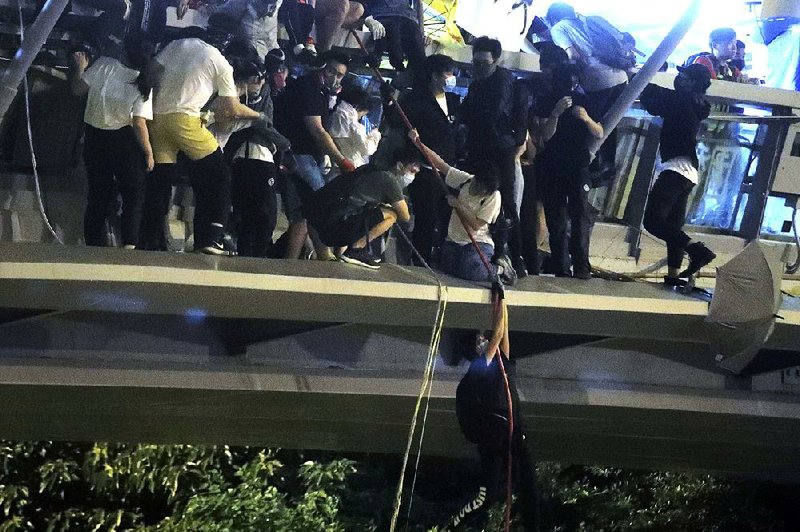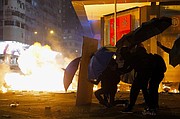HONG KONG -- About 100 anti-government protesters remained holed up at a Hong Kong university today as a police siege of the campus entered its third day.
The city's chief executive, Carrie Lam, said 600 people had left the Hong Kong Polytechnic campus, including 200 who are under 18 years old.
Lam said those under 18 would not be immediately arrested but could face charges later. The other 400 who have left have been arrested.
"We will use whatever means to continue to persuade and arrange for these remaining protesters to leave the campus as soon as possible so that this whole operation could end in a peaceful manner," she said after a weekly meeting with advisers.
Now in its fifth month, the Hong Kong protest movement has steadily intensified as local and Beijing authorities harden their positions and refuse to make concessions.
[Video not showing up above? Click here to watch » https://www.youtube.com/watch?v=70yUrtyy4GA]
Universities have become the latest battleground for the protesters, who have tried for the past week to keep riot police off of two campuses. The protesters have used gasoline bombs, bows and arrows; the riot police are backed by armored cars and a water cannon.
"These rioters, they are also criminals. They have to face the consequences of their acts," said Cheuk Hau-yip, the commander of Kowloon West district, where Polytechnic University is located.
The 600 people departed the campus hours after Hong Kong's high court struck down a contentious ban on wearing face masks in public imposed last month. The ruling that the ban was unconstitutional was a setback for Hong Kong authorities.
The pitched battle for control of Hong Kong Polytechnic University began last week as demonstrators for days fortified the campus to keep the police out. On Monday, cornered by security forces determined to arrest them, they desperately tried to get out but faced a cordon of officers armed with tear gas and water cannons.
Senior government officials said they were trying to de-escalate the situation and urged the protesters to leave peacefully and cooperate with police -- advice that seemed certain to lead to arrests and therefore strengthened the protesters' resolve to resist.
Before dawn, police allowed a group of minors to leave the campus after their high school principals secured a promise that they could go home safely. Police recorded the teenagers' details, and they could still face prosecution later, Hong Kong broadcaster RTHK reported.
The teens, some wearing masks to protect against tear gas, were seen hugging their principal as they left the cordoned-off university campus.
A day earlier, security forces used tear gas to repel one escape attempt, driving hundreds of protesters back onto the campus. Later, huge crowds of supporters advanced on foot toward the police from outside the cordon to try to disrupt the police operation.
Some protesters descended by ropes from a footbridge to a road below, where they were met by motorbike riders trying to help them flee as police fired tear gas.
All day Monday, multiple protests disrupted traffic in the Asian financial center, where schools remained closed because of safety concerns stemming from the demonstrations, which began in June but have become increasingly violent in recent weeks.
Riot officers broke into one university entrance before dawn Monday as fires raged inside and outside, but they didn't appear to get very far. Fiery explosions could be seen as protesters responded with gasoline bombs.
Police, who have warned that everyone in the area could be charged with rioting, said 154 arrests were made over the weekend. A total of 4,491 arrests have reportedly been made since the protests began in June.
Scores of people were arrested Monday morning near the university. A large group of people were seen seated outside a hotel in the Tsim Sha Tsui district of Kowloon, their hands zip-tied behind their backs.
It was unclear if the bulk of the arrestees were protesters trying to flee the campus or allies responding to calls for help evacuating protesters.
Police said that they arranged for Red Cross volunteers to enter the campus in the afternoon and provide first aid to the injured, and that the force would assist those who needed to go to the hospital "before further investigation," implying that arrests would wait until after their treatments.
Local council elections scheduled for Sunday are at risk of being delayed because of the unrest, said Patrick Nip, Hong Kong's secretary for constitutional affairs.
"The situation in the past weekend has obviously reduced the chance of holding the election as scheduled," Nip said, adding that the government "won't take this step unless absolutely necessary."
FACE MASKS ALLOWED
The protesters, meanwhile, made gains on a legal front when the high court struck down the ban on face masks.
The court said it did not consider anti-mask laws unconstitutional in general, but in this case, the law infringed on fundamental rights further than was reasonably necessary.
The ban, which was enacted in October, quickly inflamed tensions in the city and set off a series of violent clashes. Lam, imposed the ban without seeking legislative approval, invoking powers granted under the rarely used Emergency Regulations Ordinance.
In its ruling, the court said the ban violated the city's miniconstitution, known as the Basic Law, because it was too vague and endangered the ability of the Legislative Council to make the territory's laws.
"The [Emergency Regulations Ordinance] is so wide in its scope, the conferment of powers so complete, its conditions for invocation so uncertain and subjective, the regulations made thereunder invested with such primacy, and the control by the [Legislative Council] so precarious, that we believe it is not compatible with the constitutional order laid down by the Basic Law," the court said in its ruling.
GLOBAL RESPONSE
The monthslong protests started peacefully in early June, sparked by proposed legislation that would have allowed criminal suspects to be extradited to the mainland. But by the time the bill was withdrawn, the protests had hardened and broadened into a resistance movement against the territory's government and Beijing.
Activists see the extradition bill as an example of Hong Kong's eroding autonomy under Beijing's rule since the 1997 handover from colonial power Britain.
Pressured by a trade war with the United States, criticism of China's repression of ethnic minorities in Xinjiang and a slowing domestic economy, Chinese President Xi Jinping has sought to project a tough line on Hong Kong. But a bloody crackdown would play out under the glare of the world's media and further inflame worries about Hong Kong's loss of autonomy.
China's Foreign Ministry said Monday that no one should underestimate Beijing's determination to safeguard China's sovereignty and Hong Kong's stability.
The head of a nationalistic Chinese newspaper said Hong Kong police should use snipers to fire live ammunition at violent protesters.
"If the rioters are killed, the police should not have to bear legal responsibility," Global Times editor Hu Xijin wrote on his Weibo social media account.
U.S. Secretary of State Mike Pompeo tweeted that the United States was "gravely concerned by deepening political unrest and violence." The Chinese government, Pompeo concluded, "must honor its promises to the Hong Kong people, who only want the freedoms & liberties they have been promised."
U.S. Senate Majority Leader Mitch McConnell, R-Ky., in remarks delivered on the floor of the Senate, urged President Donald Trump to speak publicly in support of the protesters.
"The world should hear from him directly that the United States stands with these brave men and women," McConnell said. In Hong Kong, he added, "the world is seeing the true face of the Chinese Communist Party."
Information for this article was contributed by Ken Moritsugu, Kelvin K. Chan, Dake Kang and staff members of The Associated Press; by Elaine Yu and Russell Goldman of The New York Times; and by Casey Quackenbush, Anna Kam, Gerry Shih, Tiffany Liang, Shibani Mahtani, David Crawshaw and Ryan Ho Kilpatrick of The Washington Post.
A Section on 11/19/2019

